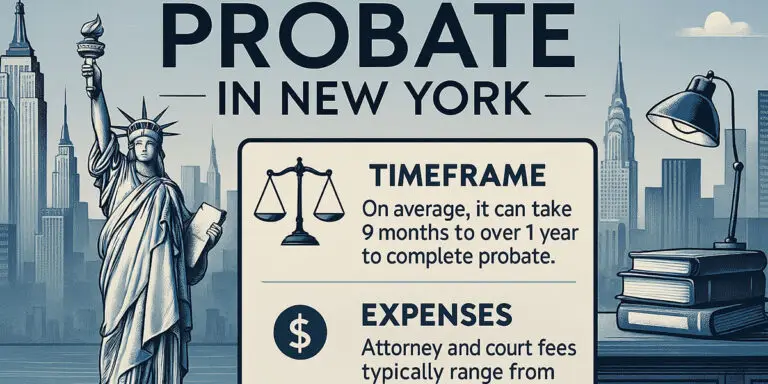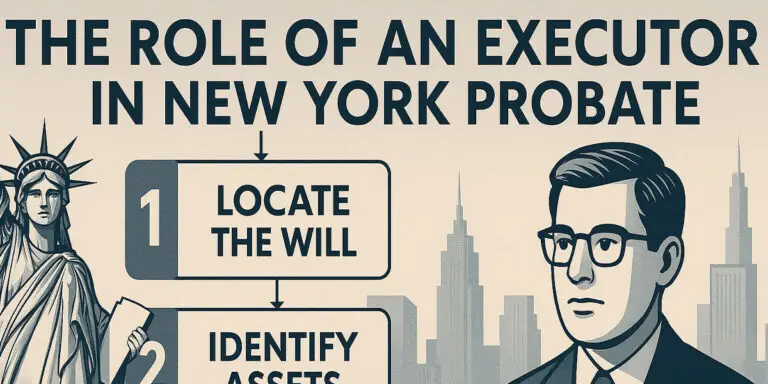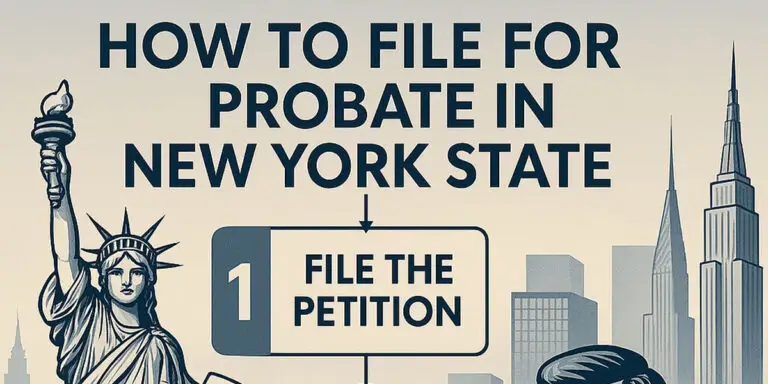How Much Does a Probate Lawyer Cost in New York? (The 2025 Expert Guide)
If you are asking this question, you are likely in a difficult and stressful position. A loved one has passed away, and you have been named the Executor of their Will. Now, on top of grieving, you are facing a complex legal process called probate and are trying to figure out the costs.
As a New York probate attorney with many years of experience, I am Russel Morgan. My firm, Morgan Legal Group, has successfully guided over 1,000 families through the New York Surrogate’s Court. The first thing I tell every client is this: The cost of a probate lawyer is not the only cost, and trying to “save money” with a “DIY” approach or a cheap, inexperienced lawyer is often the most expensive mistake you can make.
The #1 driver of cost is *error*. In our experience, a simple mistake on a petition, a failure to notify a distant heir, or an improper asset valuation can delay the process for a year and cost the estate tens of thousands in legal fees, penalties, and lost opportunities. As our 900+ positive online reviews show, our clients’ greatest relief comes from knowing the process is being handled correctly and *efficiently*.
This comprehensive 2025 guide will break down the *real* cost of probate in New York. We will explain how lawyers charge, the *other* hidden costs you haven’t considered (like Executor fees), and how to tell the difference between a good investment and a costly mistake.
The 3 Ways Probate Lawyers Charge in New York
When you call a probate attorney, you will almost always encounter one of three fee structures. It is crucial to understand the difference.
Method 1: The Hourly Rate
This is the most traditional model. The attorney and their staff (paralegals, associates) bill you for every hour they spend on your case.
- How it works: The firm will charge a “retainer” (an upfront deposit, e.g., $5,000 – $10,000) against which they will bill their time.
- The Pros: You only pay for the work that is actually done. For an extremely simple, uncontested estate, this *might* be cost-effective.
- The Cons: You have no cost certainty. Every phone call, every email, every clerical error adds to your bill. If a minor complication arises (a creditor claim, a hard-to-find heir), your legal fees can spiral out of control. It creates a stressful and unpredictable relationship with your attorney. In our experience, this model is a primary source of client anxiety.
Method 2: The Flat Fee (The Model of Clarity)
This is the model we prefer at Morgan Legal Group, and it is what you should look for. The attorney analyzes the estate and quotes you a single, fixed price for the *entire* probate administration, from start to finish.
- How it works: After a consultation, the attorney will assess the estate’s complexity (e.g., number of heirs, types of assets, potential for conflict) and provide a flat fee for all standard probate services.
- The Pros: You get 100% cost certainty. You know the *exact* legal fee from day one. This aligns your interests with the attorney’s; you both want the process completed as efficiently and correctly as possible. You are not “on the clock” and can call your attorney without fearing a surprise bill.
- The Cons: You must pay the fee, even if the case ends up being simpler than expected. However, an experienced firm with 1,000+ cases has the expertise to quote this fee accurately, building in value from the start.
Method 3: The Percentage Fee
In this model, the attorney’s fee is a percentage of the total value of the “probate estate.” This is very common in some states, like Florida, but can also be used in New York. The fee is often on a sliding scale (e.g., 3-5% of the estate’s value).
- How it works: If the probate estate is $1 million, a 4% fee would be $40,000.
- The Pros: The fee is directly tied to the value the attorney is managing.
- The Cons: This can be wildly disproportionate to the *actual work* required. Why should an attorney get paid $40,000 for a simple $1M estate that consists of one bank account, while getting paid the same for a complex $1M estate with a business, three properties, and a family fight? It often rewards the attorney for a “lazy” but high-value estate.
What is “Reasonable”? The NY Surrogate’s Court Standard
No matter the method, all legal fees are subject to approval by the Surrogate’s Court. A judge must find the fee “reasonable” based on the work performed, the time spent, the complexity of the case, and the size of the estate. This is another reason to hire an expert firm; we have a long-standing reputation with the courts for charging fees that are fair, transparent, and reflective of the high-quality work we deliver.
The “Hidden” Costs: What Your Lawyer’s Fee *Doesn’t* Include
This is the most critical part of the guide. When you ask, “What does probate cost?” you are usually *only* asking about the lawyer’s fee. But that is just one piece of the pie. As an Executor, you must pay *all* of these costs from the estate’s funds *before* any heirs get a dime.
Cost #1: The Executor’s Statutory Commission (This is a Big One)
In New York, the Executor is legally entitled to be *paid* for their work. This is not a “maybe”; it is a right set by law (SCPA § 2307). This commission is based on the value of the “probate estate” (the assets going through probate). If you are the Executor, this is *your* money (though it is taxable as income).
The commission is on a sliding scale:
- 5% on the first $100,000
- 4% on the next $200,000
- 3% on the next $700,000
- 2.5% on the next $4,000,000
- 2% on all amounts over $5,000,000
Example: The $1 Million NY Estate
Let’s say your loved one’s Brooklyn estate is worth $1,000,000.
- 5% of $100,000 = $5,000
- 4% of $200,000 = $8,000
- 3% of $700,000 = $21,000
- Total Executor Commission: $34,000
This $34,000 is a *separate cost* from the legal fees. Yes, you read that right. The Executor gets paid, and the lawyer gets paid. If you are the Executor, you can “waive” your commission (which many family members do), but you are not required to.
Cost #2: Court Filing Fees
The New York Surrogate’s Court charges a filing fee based on the value of the probate estate. This is set by law (SCPA § 2402).
- Estate of $0 – $10,000: $45
- Estate of $10,000 – $20,000: $75
- Estate of $20,000 – $50,000: $215
- Estate of $50,000 – $100,000: $280
- Estate of $100,000 – $250,000: $420
- Estate of $250,000 – $500,000: $625
- Estate of $500,000 or more: $1,250
For most estates in New York City, the filing fee is $1,250.
Cost #3: Appraisal and Valuation Fees
You cannot just “guess” what assets are worth. The court and the IRS require formal, “date-of-death” appraisals for many assets.
- Real Estate: You will need a certified appraisal for the decedent’s Queens house or Long Island condo.
- Co-ops: Co-ops are notoriously complex. You need a valuation specialist who understands co-op shares.
- Businesses: A formal business valuation is required.
- Collectibles: Valuable art, jewelry, or antiques must be professionally appraised.
These fees can range from a few hundred to many thousands of dollars.
Cost #4: Miscellaneous & Administrative Costs
There is also a “cost of doing business.” This includes:
- Surety Bond: If there is no will (an “Administration”) or if the will does not waive it, the court may require the Executor to post a bond, which is an insurance policy against their mistakes.
- Accountant Fees:
- Certified Mail:
What Makes a NY Probate *More* Expensive? (The “1,000+ Case” Experience)
When a client asks for a flat fee, our quote is based on *complexity*. A $1M estate in cash is 10x easier than a $1M estate with a failing business. Based on our 1,000+ cases, these are the top 4 factors that drive up costs.
Factor 1: A Will Contest (The #1 Cost-Driver)
This is the worst-case scenario. A disinherited child or a new spouse from a second marriage files a “Will Contest.” They claim undue influence, lack of capacity, or fraud. The estate is now frozen in active litigation. The “simple” probate becomes a 3-5 year legal war. The legal fees for this litigation (paid by the estate) can easily reach $100,000 or more, all while the assets are locked.
Factor 2: Complex or Hard-to-Manage Assets
Time is money, even on a flat fee. An estate with a single bank account is simple. An estate with a Brooklyn co-op, a rental property, and a 50% share in an LLC is extremely complex. It requires navigating co-op boards, managing tenants, and valuing a business. This requires more work and thus a higher fee.
Factor 3: Intestacy (Dying Without a Will)
If a person dies without a will, the process is called “Administration.” This is often *more* expensive than probate. Why? Because we must first *prove* to the court who the legal heirs are. This can involve hiring a genealogist to find a long-lost cousin and navigating a complex “kinship hearing.”
Factor 4: Creditor Claims (Especially Medicaid)
The Executor must pay all legitimate debts. This includes credit cards, mortgages, and taxes. The most complex claims come from Medicaid. If the decedent received long-term care, the state *will* file a claim against the estate. Negotiating or disputing this elder law claim requires specialized expertise.
The Real Cost: A “Cheap” Lawyer vs. An Expert
Clients often say, “I found a lawyer who will do it for $2,000.” As our 900+ positive reviews show, the value of an expert is not in the fee they charge, but in the disasters they prevent. The *real* cost is the cost of a mistake.
Scenario: The “Cheap Lawyer” Mistake
A cheap lawyer misses a disinherited, non-marital child. The probate is almost finished. The child finds out, and the *entire* 18-month process is invalidated. The Executor is removed, and all prior actions are voided. The estate is now in costly litigation, and the “cheap” lawyer has cost the family $50,000 and two years of their life.
The Expert Solution
An expert firm with 1,000+ cases, like Morgan Legal Group, knows this. We conduct a *thorough* due diligence search *first*. We find the child, serve them the proper notice, and handle their claim upfront. The process is clean, final, and protected from future attacks.
How to Pay for a Probate Lawyer? (The Estate Pays)
This is the most important piece of good news. As the Executor, you do not pay the probate lawyer from your own pocket. The legal fees, the filing fees, and all administrative costs are legitimate *debts of the estate*. They are paid from the estate’s bank account. You do not have to write a personal check.
The Best Solution: How to Avoid Probate Costs Entirely
After reading all this, you are probably wondering how to save your family from this process. The answer is simple: a Revocable Living Trust.
A probate lawyer costs what it does *because* the court process is so complex. A Revocable Trust avoids this 100%. Assets in a trust are *private*. They pass to your heirs immediately, with no court, no judge, no public filings, no Executor commissions, and no 2-year delays. While a trust has a higher upfront cost to create, it saves your family tens (or hundreds) of thousands of dollars and years of stress on the back end. It is the ultimate estate plan.
Why Choose Morgan Legal Group?
If you are an Executor, you are a fiduciary. You are *personally liable* for mistakes. Hiring an expert is your best protection. Our firm has many years of experience and over 1,000 successful cases in the New York Surrogate’s Courts. We know the procedures, the staff, and the judges. We offer flat-fee billing so you have perfect clarity.
You are facing a difficult journey. You do not need to walk it alone. Schedule a consultation with our team today. We serve clients throughout New York City and beyond. You can see our Google Business Profile and reviews, and then call us for the peace of mind you deserve.
For the official schedule of executor commissions, you can review the NY Senate Law SCPA § 2307.







